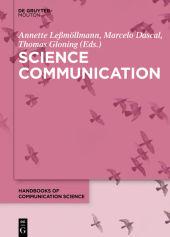 Neuerscheinungen 2019Stand: 2020-02-01 |
Schnellsuche
ISBN/Stichwort/Autor
|
Herderstraße 10
10625 Berlin
Tel.: 030 315 714 16
Fax 030 315 714 14
info@buchspektrum.de |

Marcelo Dascal, Thomas Gloning, Annette Leßmöllmann
(Beteiligte)
Scientific Communication
Herausgegeben von Dascal, Marcelo; Gloning, Thomas; Leßmöllmann, Annette
2019. 600 S. 240.00 mm
Verlag/Jahr: DE GRUYTER; DE GRUYTER MOUTON 2019
ISBN: 3-11-025551-0 (3110255510)
Neue ISBN: 978-3-11-025551-5 (9783110255515)
Preis und Lieferzeit: Bitte klicken
This handbooks series aims to integrate knowledge of communication structures and processes. It is global in orientation, dedicated to cultural and epistemological diversity as well as different scholarly approaches. The series features volumes on ´messages, codes and channels´, ´mode of address: communication situations and context´, ´methodology in communication science´ and ´application areas´. The latter features volumes devoted to a large range of specialist areas of communication science. The series as a whole aims at meeting the needs of undergraduates, postgraduates, academics and researchers across the area of communication studies.
Science is an essentially cooperative, critical, and dynamic enterprise. Were it not for the continuous creation and improvement of special forms of communication, argumentation, and innovation, all of them suitable for its three key features, scientific knowledge and progress could hardly be achieved. The aim of this volume is to explore the nature of science communication in its several functions, modalities, combinations, and evolution - past, present, and future. One of our objectives is to provide an overview of the richness and variety of elements that take part in performing the complex tasks and fulfilling the functions of science communication. The overall structure and criteria for the choice of topics: 1. The origin and target of a communication episode - its source(s) and addressee(s).2. The media of communication employed.3. The thematic field and content types.4. The distinction between aspects of science communication (e.g., media, texttypes, domains, communicative maxims) and aspects of research on science communication (e.g., the contribution of different research traditions to the understanding of science communication).5. The history and dynamics of science communication (past, present, and future), both in an empirical perspective (e.g., the development of the research article) and a systematic perspective (e.g., what are basic types and mechanisms of change in science communication).
Annette Leßmöllmann, Karlsruhe Inst. of Technology; Marcelo Dascal, University of Tel Aviv, Israel; Thomas Gloning, University Gießen


